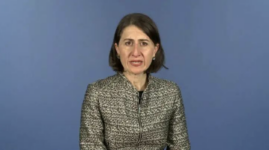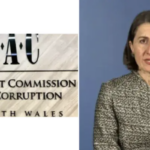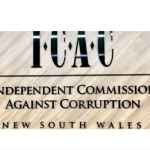Corrupt Conduct is a Crime, But Will Gladys be Criminally Prosecuted?

Gladys Berejiklian has lost her appeal to overturn ICAC’s finding that she engaged in “serious corrupt conduct” during her tenure as the Premier of New South Wales.
Ms Berejiklian’s appeal relied on what she perceived to be a potential legal loophole whereby the ICAC member who delivered the report in which the findings against her were contained, former Judge Ruth McCall, was no longer a member when the findings were formally made in the Commission.
The former premier’s lawyers argued that as Ms McCall’s tender had expired, she did not have the power to hand down the decision in the ICAC.
But in a 2:1 decision, the full bench of the Court of Appeal found that although the former judge’s tenure had indeed expired, she remained a consultant for the corruption watchdog and could make the formal findings.
“The assistance provided by Ms McColl was not outside the limits of her authority, and in making the Report the Commission did not act beyond its authority or power in obtaining Ms McColl’s assistance as a consultant,” Chief Justic Andrew Bell and Justice Anothony Meagher found.
Justice Julie Ward disagreed, finding Ms McColl did not have the power to make formal findings against the former premier as she was no longer a member of the state’s corruption watchdog.
The decision means Ms Berejiklian has exhausted her legal avenues to challenge the ICAC’s finding of serious corrupt conduct against her.
The question that now remains for many is: will the former premier face legal consequences for her actions? And in particular, will she be charged with a criminal offence given her conduct can potentially amount to any of several offences, including but not limited to the common law offence of misconduct in public office, which has been used against several other former politicians including Eddie Obeid and Ian Macdonald?
The legal saga
But let’s take a step back to where this all began.
Gladys Berejiklian resigned as premier in October 2021, amid an investigation by the Independent Commission Against Corruption into former Liberal MP Daryl Maguire.
During the investigation, secret recordings tendered as evidence to the ICAC investigation of conversations between Mr Maguire and Gladys Berejiklian revealed the two had been in a ‘close personal relationship’ for five years (until 2020) which had never been disclosed, despite Ms Berejiklian being involved in dubious decisions to make unmeritorious grants for the benefit of her partner’s electorate of Wagga Wagga.
The recordings were also highly suggestive of the fact Ms Berejiklian knew, or was at least reckless to the fact that, her partner was involved in corrupt conduct including a shady deal in Badgerys Creek – telling her partner “I don’t need to hear about that” when he brought it up.
Mr Maguire resigned from his position in disgrace in 2018, and was later successfully criminally prosecuted.
The revelations regarding Ms Berejiklian’s misconduct were a shock to many of her supporters, despite the then premier attempting to explain her actions by stating she is a ‘very private person’ and the mainstream media giving the situation a favourable and even sympathetic spin.
Questions then began to surface as to the extent to which Ms Berejiklian was aware of ‘dodgy’ dealings undertaken by Mr Maguire, where he had used his position as MP inappropriately, for his own gain, and had also failed to disclose this information.
Serious Corrupt Conduct
ICAC ultimately determined that both Mr Maguire and Ms Berejiklian had engaged in serious corrupt conduct, and although Mr Maguire’s case was referred to the Director of Public Prosecutions, ICAC did not recommend Ms Berejiklian be referred for criminal prosecution.
ICAC’s five findings against the former Premier related to multimillion-dollar grants to the Australian Clay Target Association (ACTA) for $5.5 million and the Riverina Conservatorium of Music (RCM) for $10 million in Mr Maguire’s Wagga Wagga electorate. At the time the grants were awarded, Ms Berejiklian was a member of the Expenditure Review Committee which approved them.
ICAC also found that Ms Berejiklian’s relationship had the “capacity” to “influence” her public duties.
Despite a number of scandals (including shredding documents and admitting to pork barrelling tens of millions of dollars worth of public funds) during her time as Premier, Gladys Berejiklian has always aimed to retain an impeccable public image.
As a result, she launched legal proceedings in a bid to overturn the Independent Commission Against Corruption’s findings and restore her reputation.
She challenged the validity of the report detailing ICAC’s findings on grounds that ICAC was acting beyond its authority under the Independent Commission Against Corruption Act 1988.
Appeal dismissed
As touched upon earlier, Ms Berejiklian’s appeal was based on the notion former judge Ruth McColl, who had overseen the ICAC hearings, finished her term with watchdog in October 2022.
She then delivered her final report in June 2023, in a capacity as ‘consultant’ to the Chief Commissioner. Therefore, the Berejiklian legal representatives argued, Ms McColl was outside the limits of her authority in making the report.
The Court of Appeal ultimately dismissed all 13 grounds of Ms Berejiklian’s application for judicial review.
The power to conduct a judicial review is set out in section 69 of the Supreme Court Act 1970 (NSW), and it is important to note the Court of Appeal can only consider errors of law, rather than factual errors.
Failure to accept responsibility
In a statement following the decision, Ms Berejiklian said: “I always worked my hardest to look after the welfare and interests of the people of New South Wales”, entirely failing to accept responsibility for her conduct.
As the chair of the Centre for Public Integrity, Anthony Whealy KC, remarked, ““I don’t think even today she recognises there was a substantial conflict of interest… “That’s a great shame because she did a lot of good things as premier. I think this has really undone her reputation in a really damaging way.”
Will criminal charges be brought?
All indications to date are that criminal charges will not be brought against Ms Berejiklian, despite there being a strong argument it could amount to a crime under the laws of our state.
There are a number of common law as well as statutory offences that can apply to corrupt conduct.
Common law offences
Common law offences include misconduct in public office, bribery and extortion.
In Ms Berejiklian’s case, the offence of misconduct in public office is arguably the most applicable.
In that regard, courts have found that “it is an offence for a public official, in the course of or connected to his or her public offence, to wilfully misconduct himself or herself by act or omission without reasonable excuse or justification, where such misconduct is serious and meriting criminal punishment.”
Penalties for common law offences are “at large”, which means there are no maximum penalties that apply.
However, those found guilty of the offence have consistently received lengthy prison sentences. One such person is former New South Wales Labor Minister Eddie Obeid , who in late 2021 was sentenced to a minimum prison term of three years and 10 months over a serious corruption scheme.
Statutory offences
The main statutory offences that are capable of applying to corruption are primarily contained in the Crimes Act 1900 (NSW).
These offences include giving corrupt advice via inducement of benefits, corruptly benefiting a trustee, and aiding and abetting corrupt conduct.
Some of these statutory offences – such as receiving corrupt rewards or producing misleading documents – are framed around “agents”, who are people defined as “serving under the Crown”, which includes ministers of parliament.
But despite the availability of the offences, the most likely outcome for Ms Berejiklian is she will escape having her case tested in the courts altogether.







